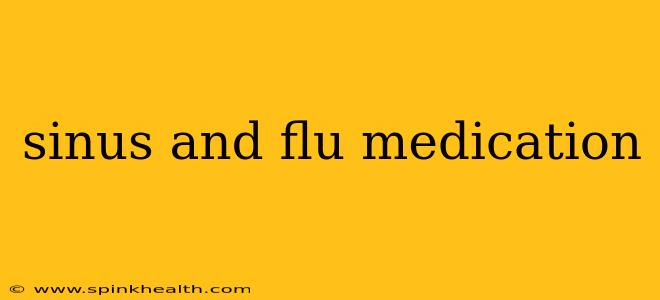Ah, the dreaded sniffles, the throbbing headache, the feeling of utter exhaustion. The common cold and the flu, along with their pesky sinus infection companions, can leave you feeling completely wiped out. Navigating the world of over-the-counter (OTC) sinus and flu medication can feel like wading through a swamp of confusing labels and ingredients. This guide will help you understand the landscape, empowering you to choose the right medication and know when it's time to seek professional help.
My journey started years ago, battling a particularly nasty flu. Armed with a fistful of brightly colored boxes, I felt more confused than relieved. After many trial-and-error experiences (and a few sleepless nights), I learned a thing or two about effectively managing cold and flu symptoms, and I'm happy to share that knowledge with you.
What's the Difference Between a Cold, the Flu, and a Sinus Infection?
Before diving into medication, it's crucial to understand the differences between these common illnesses. They often overlap in symptoms, making self-diagnosis tricky.
-
The Common Cold: Typically involves milder symptoms like a runny nose, sore throat, cough, and congestion. It usually resolves within 7-10 days.
-
The Flu (Influenza): More severe than a cold, the flu brings on high fever, body aches, fatigue, and sometimes vomiting and diarrhea. It can last for a week or longer and can lead to serious complications.
-
Sinus Infection (Sinusitis): This is an infection of the sinuses, often developing as a complication of a cold or the flu. Symptoms include facial pain or pressure, thick yellow or green mucus, and congestion.
What OTC Medications Can Help Relieve Sinus and Flu Symptoms?
Numerous OTC medications target specific symptoms. Let's explore some common options:
Pain and Fever Reducers:
- Acetaminophen (Tylenol): Reduces fever and relieves pain.
- Ibuprofen (Advil, Motrin): Reduces fever, relieves pain, and can help reduce inflammation.
Decongestants:
- Pseudoephedrine (Sudafed): A powerful decongestant that can clear nasal passages. Requires ID purchase in many places due to its use in methamphetamine production.
- Phenylephrine: A less potent decongestant.
- Decongestant nasal sprays: Provide temporary relief but should be used for only a few days to prevent rebound congestion.
Cough Suppressants:
- Dextromethorphan (Robitussin DM): Suppresses coughs. Note that some coughs are productive, meaning they help clear mucus. Suppressing these could be counterproductive.
Expectorants:
- Guaifenesin (Mucinex): Helps thin and loosen mucus, making it easier to cough up.
What Are the Best Over-the-Counter Medications for Sinus Congestion?
Sinus congestion can be incredibly uncomfortable. OTC options include:
- Saline nasal sprays: Help rinse nasal passages and clear out mucus. These are generally safe for frequent use.
- Decongestant nasal sprays (as mentioned above): Provide temporary relief, but use cautiously due to potential rebound congestion.
- Oral decongestants (pseudoephedrine or phenylephrine): These work by shrinking swollen blood vessels in the nasal passages.
Are There Any Natural Remedies for Sinus and Flu Symptoms?
Many people find relief through natural remedies:
- Rest: Crucial for your body to fight off illness.
- Hydration: Drink plenty of fluids to thin mucus and prevent dehydration.
- Humidifier: Adds moisture to the air, which can ease congestion.
- Warm compresses: Soothe facial pain and pressure from sinus infections.
When Should I See a Doctor for Sinus and Flu Symptoms?
While many cases of colds and the flu resolve on their own, seek medical attention if:
- Your symptoms are severe: High fever, severe body aches, difficulty breathing, or persistent vomiting/diarrhea.
- Your symptoms worsen: Symptoms that don't improve after a week or get progressively worse.
- You have underlying health conditions: If you have asthma, heart disease, or a weakened immune system.
- You develop complications: Such as pneumonia, bronchitis, or a severe sinus infection.
What Questions Should I Ask My Doctor About Sinus and Flu Medication?
This is where personalized advice comes in. Your doctor can tailor treatment to your specific needs and medical history. Don't hesitate to ask about:
- The best medication for your specific symptoms and health status.
- Potential drug interactions if you're on other medications.
- When to expect symptom improvement.
- What to do if your symptoms worsen.
This journey through the world of sinus and flu medication should equip you with the knowledge to make informed decisions. Remember, while OTC medications can provide relief, they aren't a replacement for professional medical advice. When in doubt, consult your doctor!

